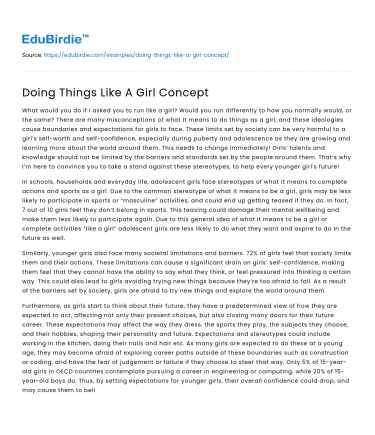What would you do if I asked you to run like a girl? Would you run differently to how you normally would, or the same? There are many misconceptions of what it means to do things as a girl, and these ideologies cause boundaries and expectations for girls to face. These limits set by society can be very harmful to a girl’s self-worth and self-confidence, especially during puberty and adolescence as they are growing and learning more about the world around them. This needs to change immediately! Girls’ talents and knowledge should not be limited by the barriers and standards set by the people around them. That’s why I’m here to convince you to take a stand against these stereotypes, to help every younger girl’s future!
In schools, households and everyday life, adolescent girls face stereotypes of what it means to complete actions and sports as a girl. Due to the common stereotype of what it means to be a girl, girls may be less likely to participate in sports or “masculine” activities, and could end up getting teased if they do. In fact, 7 out of 10 girls feel they don’t belong in sports. This teasing could damage their mental wellbeing and make them less likely to participate again. Due to this general idea of what it means to be a girl or complete activities “like a girl” adolescent girls are less likely to do what they want and aspire to do in the future as well.
Save your time!
We can take care of your essay
- Proper editing and formatting
- Free revision, title page, and bibliography
- Flexible prices and money-back guarantee
Similarly, younger girls also face many societal limitations and barriers. 72% of girls feel that society limits them and their actions. These limitations can cause a significant drain on girls’ self-confidence, making them feel that they cannot have the ability to say what they think, or feel pressured into thinking a certain way. This could also lead to girls avoiding trying new things because they’re too afraid to fail. As a result of the barriers set by society, girls are afraid to try new things and explore the world around them.
Furthermore, as girls start to think about their future, they have a predetermined view of how they are expected to act, affecting not only their present choices, but also closing many doors for their future career. These expectations may affect the way they dress, the sports they play, the subjects they choose, and their hobbies, shaping their personality and future. Expectations and stereotypes could include working in the kitchen, doing their nails and hair etc. As many girls are expected to do these at a young age, they may become afraid of exploring career paths outside of these boundaries such as construction or coding, and have the fear of judgement or failure if they choose to steer that way. Only 5% of 15-year-old girls in OECD countries contemplate pursuing a career in engineering or computing, while 20% of 15-year-old boys do. Thus, by setting expectations for younger girls, their overall confidence could drop, and may cause them to believe they have limited choices for their future.






 Stuck on your essay?
Stuck on your essay?

